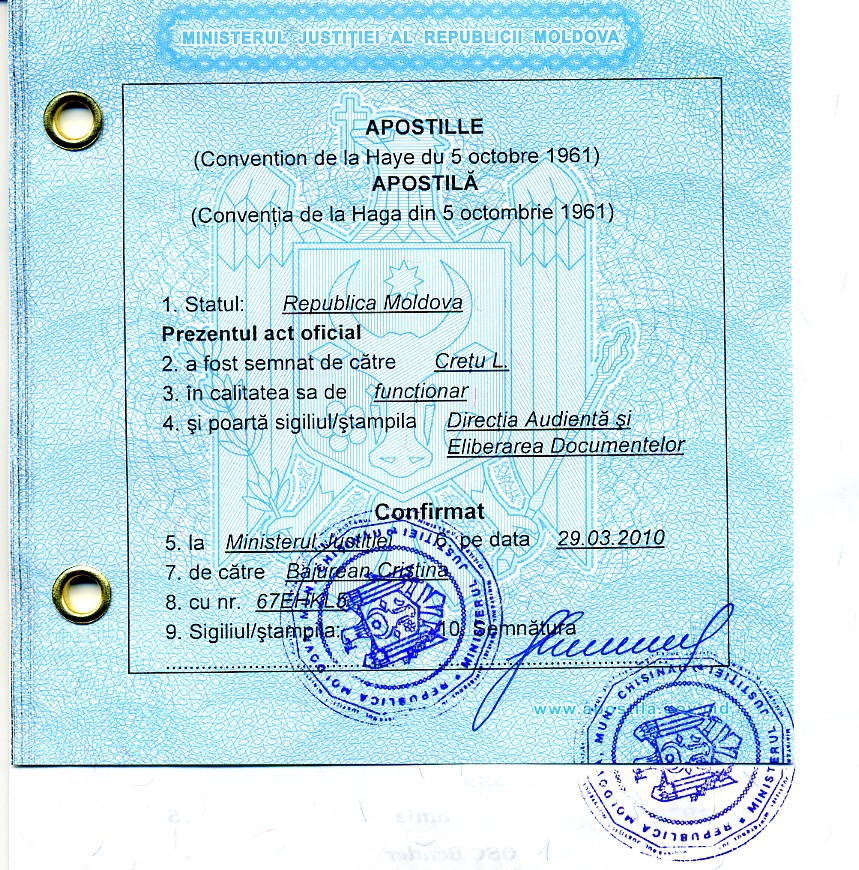Apostille Moldova
The apostille in the Republic of Moldova began to be applied from March 16, 2007. Over 15 years, the apostille in Moldova has evolved from a blue stamp Apostille to an electronic Apostille. The decision to transition to the electronic apostille was made based on the practice of checking the Apostille: a rather lengthy procedure through an official inquiry and response. Moreover, without checking the apostille, there was a high risk of its forgery.
You can verify the electronic apostille online on the website of the Ministry of Justice of the Republic of Moldova. The Ministry of Justice of the Republic of Moldova has published 10 regulatory acts (laws and resolutions) regulating the affixing and use of the Apostille in the Republic of Moldova.
The most important document is ПОСТАНОВЛЕНИЕ № 163 от 15-02-2007 on the approval of the Regulations on the procedure for affixing the apostille. The text of this Resolution states:
Apostille – an imprint of a stamp… filled in all columns and sealed in the appropriate order.
Affixing the apostille – is the only formal procedure that may be required to verify the authenticity of the signature, the capacity in which the person signing the document acted, or, if necessary, the authenticity of the seal or stamp with which this document is affixed.

Example of an apostille used before the electronic apostille in the Republic of Moldova. This type of apostille was a printout of the Apostille with a wet seal of the Ministry of Justice of the Republic of Moldova and the signature of an official. This apostille was stitched to the document with metal rings. As you can see in point 8 of this printout, the apostille number is specified. But to check this apostille by its number was possible only by calling the ministry or by an official request through the post office.
Despite this, in the Republic of Moldova the Apostille is not practiced as a stamp in the traditional sense. Here, only the electronic apostille is used (complying with all requirements for the information contained in the Apostille) with the possibility of its online verification using a secret code and a special Apostille number.
Below is an example of the new electronic apostille pattern in the Republic of Moldova:
This apostille also comes with a secret code mentioned below. The apostille itself accommodates all the necessary information on an A4 format sheet. It can be printed and simply attached to the document. This apostille does not bear a wet seal and does not have the wet signature of an official. It can be checked online, which saves time for the foreign body receiving the documents.
According to the information received from the Ministry of Justice of the Republic of Moldova and based on Moldovan and international legislation, the following documents can be apostilled:
Apostilles are issued only for official documents drafted in the territory of the Republic of Moldova, which have legal force in the territory of a state-party to the Convention. Official documents issued on behalf of and in the interests of natural and legal entities, namely:
a) Civil status documents, issued after February 24, 1998.
Originals and duplicates:
– birth certificate,
– marriage certificate,
– divorce certificate (on marriage dissolution),
– death certificate,
– notice (notification) of surname change,
– notice (notification) of personal data modifications,
– birth extract (in case of a person’s death),
– marriage extract (in the event of the death of one of the spouses).
Originals:
– a certificate of civil status (indicating that a person is not married).
b) Educational documents, issued by accredited educational institutions:
– school education certificate (on complete secondary education, on vocational complete secondary education),
– a student’s transcript,
– college graduation diploma,
– university graduation diploma,
– diploma from courses under the Ministry of Education of the Republic of Moldova.
These are submitted with confirmation from the educational institution that issued the education document, or from the Ministry of Education;
c) Education documents issued since 1992 by educational institutions of the administrative-territorial units on the left bank of the Dniester and the urban district of Bender, prepared on forms approved by the Ministry of Education, Culture, and Research, whose prints and stamps are not valid. These do not contain symbols of the state, symbols of other state-type formations, or equivalent signs and mentions, except for symbols of the Republic of Moldova.
The reference here is to simplified forms of diploma confirmation indicating the surname, first name, and patronymic.
d) Notary documents (e.g., certificate, power of attorney, declaration, contract, will, etc.);
e) Documents originating from courts, prosecutors, or judicial officers (e.g., court order, conclusion, verdict, decree, references, etc.);
f) Documents from the National Social Insurance Fund confirming employment history for pension accrual, employment history accounting, benefit accrual – abroad.
g) References and medical certificates issued by the central and regional commission for medical examination of migrants and the National Public Health Center/AIDS Prevention and Control Center;
h) Official documents issued upon request and on behalf of natural and legal entities, falling under the scope of Article 1 of the Convention Abolishing the Requirement of Legalisation for Foreign Public Documents, signed in The Hague on October 5, 1961.
For example, a certificate of no criminal record (a certificate of lack of criminal record).
i) Notarially certified copies and translations of apostilled documents mentioned above.